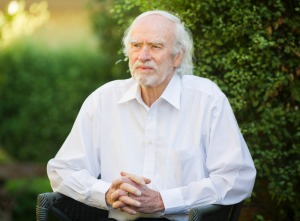
The ACT Visiting Medical Officers’ Association president Dr Peter Hughes says Chief Minister Katy Gallagher is using “rubbery” figures to cover up dwindling numbers of private specialists working under contract in Canberra’s hospitals. Photo: Rohan Thomson
Chief Minister Katy Gallagher is using “rubbery” and “misleading” figures to cover up dwindling numbers of private specialists working under contract in Canberra’s hospitals, the union representing the doctors says.
The ACT Visiting Medical Officers’ Association has repeatedly accused ACT Health of a deliberate campaign to scale back the numbers of visiting specialists and replace them with salaried doctors in a bid to have more control over staff.
Ms Gallagher rejected the allegations in a Canberra Times’ opinion piece on Thursday.
But the union’s president Dr Peter Hughes hit back saying figures cited by Ms Gallagher, showing the number of VMOs employed had risen from 155 in 2007 to 198 in 2014, were misleading.
In May figures released by ACT Health showed there were 129 VMO in 2012/13 but “improved’ figures tabled in the assembly on November 10 said there were 191, among several discrepancies in the numbers of salaried specialists and VMOs over four years.
But a spokeswoman for ACT Health defended the differing data saying the figures were based on “different questions”.
“The VMO figures provided in both instances were based on a combination of ACT Health annual report figures, which are for VMOs paid more than $25,000 only, and statistics provided by Calvary,” she said.
She said the figures produced in May excluded part-time staff and VMOs working at Calvary.
While the figures provided to the assembly reflected all active VMO contracts with Canberra Hospital regardless of the amount paid, but did not include VMOs contracted exclusively to Calvary Health Care.
Dr Hughes said regardless of how much VMOs earn, data showed the numbers of VMOs were below that of salaried staff and VMOs remained “essential” to the functioning of a public hospital.
In 2013/14 there were 237 salaried staff and 198 VMOs.
“They’re using VMOs as little as possible and in some departments they’ve totally replaced them,” he said.
“ACT Health officers have repeatedly stated that the non-renewal of VMO contracts was rare, but in fact there has been non-renewal of the contracts of three VMOs in recent months.
“The Chief Minister implied that only staff specialists can respond to patients’ needs as they arise but when a VMO is rostered on call they are on call 24 hours per day and can also respond to patients’ needs as they occur.”
ACT Australian Medical Association (AMA) president and Canberra Hospital VMO Dr Liz Gallagher, no relation to the Chief Minister, said there were roles for VMOs and staff specialists.
“VMOs bring a skillset that isn’t necessarily met by all staff specialists and really the best person for job… [depends] on the skills mix required and the operational needs of the hospital,” she said.
“One of the issues we’ve had is that the majority of jobs currently advertised are for staff specialists only and we believe they should be advertised for staff specialist or VMO and the best person on merit appointed.”
She would not comment on suggestions ACT Health was deliberately scaling back VMO numbers in an attempt to have more control over staff.
“Within our department the numbers [of VMOs] have been fairly constant,” Dr Gallagher said.
“We’re short; we actually need to employ a few more staff specialists to take care of day to day running of the department… [but] sometimes you can’t attract VMOs either.”
Ms Gallagher acknowledged VMOs gave the public health system access to specialist skills especially in areas where there wasn’t enough demand for a full time staff member.
But she said in other areas of the hospital, such as neurosurgery and intensive care, the “most complex and challenging work” was “importantly” left up to staff specialists in the public system.
Dr Hughes said it was “nonsense and insulting” for Ms Gallagher to imply that VMO neurosurgeons were less skilled than salaried neurosurgeons.
